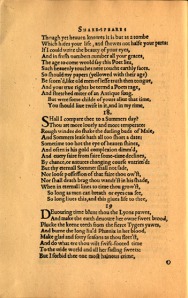The following is a copy of the talk I’ve been compelled into delivering for one of my coursework subjects this semester.
Hello everyone.

Cicero (Who was a kick ass orator, just ask him.)
I’m from the English, Media and Performing Arts school of UNSW and I’m going to talk to you very quickly about what is the central notion of my Masters Thesis. We’ll look at two ideas that I’ll be considering further in the full thesis project, and we’ll also have a look at some examples that illustrate these concepts.
The thesis itself is an examination of the ability of poetic language to make us see visually, or at least to make us experience poetic meaning through visual metaphor.
I tend to approach this idea as a cognitive, phenomenological concept, so that’s the filter I’ll be using for this particular discussion
1
There are, ostensibly, two types of ways that images can operate on a basic level, which I refer to as internal and external genesis. The internal genesis is where, rather than describing a visual sensation, the poet conjures a sense of seeing and experiencing by suggesting the arrangement of elements that are already within the reader’s understanding.
A regular user of this type of imager was Wordsworth, and a couple of verses pulled from his much longer poem ‘The idiot Boy’ make a good example.
But Betty’s bent on her intent,
For her good neighbour, Susan Gale,
Old Susan, she who dwells alone,
Is sick, and makes a piteous moan,
As if her very life would fail.
There’s not a house within a mile,
No hand to help them in distress;
Old Susan lies a bed in pain,
And sorely puzzled are the twain,
For what she ails they cannot guess.
Wordsworth doesn’t draw the image for you, instead, in the way the Romantics adored, the image comes filtered through human experience, and so we are told ‘there’s not a house within a mile’ leaving us to conjure the lonely pastoral house from our own conceptions. Similarly, are told that Susan ‘is sick’, and ‘lies a bed in pain’ but the image of an ill woman isn’t painted for us, it comes from inside and presses outwards on the experience of the poem, the meaning moving from our knowledge towards the poem.
The External genesis is where the image is ‘painted’ for us by the poet. This is a more easily understood form of image and has been readily described by the poets and critics for thousands of years.

William Carlos Williams (kick ass poet)
The Roman poet ‘Horace’ called this ‘ut picture poesis’, paraphrased as ‘poetry is like painting’. This form of imagery has been a favourite to many of the poetry movements over the years, the neo-classicists, romantics and modern poets had a lot of fun with it. It is probably most famous for its deliberate centralisation by the Imagists of the early 1900s. A number of very good examples can be found for this style, but I think William Carlos Williams is probably the most sophisticated but accessible poets of this type. One simple example is his poem ‘The red Wheelbarrow’:
The Red Wheelbarrow
so much depends
upon
a red wheel
barrow
beaded with rain
water
beside the white
chickens.
Rather than asking us to conjure the image internally, the objects are painted for us by the poem. They are painted in minimalist, modernist terms certainly, but they are painted. This was Williams’ intent. He wanted us to see the objects, with the aim of breaking down the distance between the word and the thing. In this way the meaning of the image is directed from its external existence into the reader and the meaning moves from poem to knowledge.
2
The second point I wish to make about the cognitive operation of the image is the idea that the image as a figurative unit can be broken down into two halves. I call these the physical half and the symbolic half of an image. As I was casting my mind around for examples I passed a kebab shop and I thought that its name would make a fine example, so well go with that. It was ‘The Golden Kebab.’
When something is being described as golden, how does it operate in terms of the dual existence of the image?
The physical half of an image operates by referring to a real physical thing that could be seen and touched. A golden kebab, then, in this shop name would be a physical kebab made out of gold. Yellow, heavy, hard yet pliable and completely unappetising.

Kebab (just ass)
But the name ‘the golden kebab’ isn’t operating on the physical level the way ‘The red wheelbarrow’ was. That was literally a red wheel barrow, and it’s the physical nature of the image that is being used in that poem. With ‘the golden kebab’ the metaphor comes from the conceptual side of the image.
In the conceptual sense refers to the symbolic connotations that are suggested by the physical thing, or the idea of the physical thing. Something golden is precious and valuable. Something is golden if it is the best of its class, a golden boy, the golden child, the golden crown of a king. It implies authority, value, purity and supremacy. So ‘the golden kebab’ uses transference of the conceptual elements of gold for their metaphor, rather than the physical.
Conclusion.
Poetry is one of the ways a culture talks about itself, questions itself, its actions and its values. The image is the way in which experience is brought into the poetry and directed either from the reader into the poem, or from the poem towards a new understanding in the reader. You can tell a lot about a society by looking at how they used the image in their poetry, it’s like a handshake. Everyone uses it, but always a little differently.
~Chris









You must be logged in to post a comment.